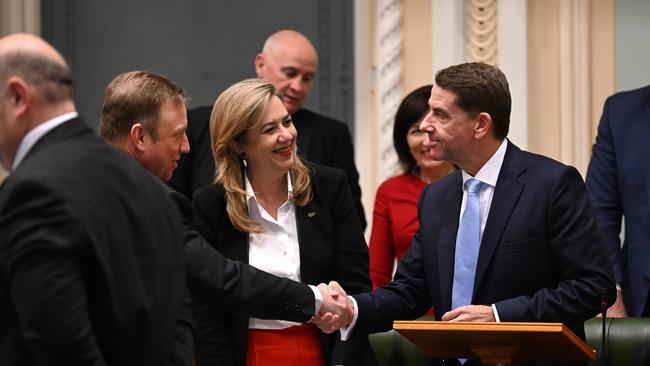Queensland budget: Unions’ wage demands to cost state $750m
Queensland’s expanding public service wage bill could blow out by an extra $750m each year if the state government gives in to union demands for pay rises that keep pace with inflation.

Queensland’s expanding public service wage bill could blow out by an extra $750m each year if the state government gives in to union demands for pay rises that keep pace with inflation.
The Palaszczuk government is planning to hire more than 8000 full-time equivalent (FTEs) public servants in the 2022-23 financial year, bringing its hiring spree to nearly 50,000 extra government staff since it was elected in 2015. Queensland will employ 250,831 public service FTEs by June 30 next year.
Its employee expenses will spike $2.1bn to $30bn next financial year, or 7.7 per cent higher than 2021-22, and, by 2025-26, the cost of the bureaucracy is forecast to hit $33.7bn, not including public service superannuation. Public service wages are by far the biggest single expense to the budget, accounting for 40 per cent of the $74.9bn overall expenses bill.
But the government could soon be slugged even more. Unions are gearing up for a major wage battle with the Labor administration, with 24 public service agreements expiring this year, including for nurses, teachers, police, firefighters, doctors and paramedics.
Those agreements – and the budget figures – are predicated on a wage rise of 2.5 per cent per annum.
But many unions will push for far higher increases, starting with the Queensland Nurses and Midwives’ Union, which threatened protest action outside government headquarters if it didn’t secure a 5.1 per cent increase for its members.
The QNMU argues a 2.5 per cent wage increase is “clearly not enough to keep up with the rising cost of living … (or) enough to acknowledge and reward the incredible work you do every day to keep our health system going”.
“That’s why we’re calling on Queensland’s Treasurer, Cameron Dick, to value our work by lifting the government’s wages policy to 5.1 per cent in line with national inflation,” the union told its members in a recent missive about enterprise bargaining negotiations.
The fine print of the budget papers warns “a one-percentage-point increase in wage rates above (the 2.5 per cent) expectation would increase employee expenses by around $300m per annum”.
If all unions lobby for a rise above 5 per cent, the cost to the budget is estimated to be at least $750m per year.
Mr Dick suggested there would be an increase in the government’s wage policy after “good faith” negotiations with unions, but would not say by how much.
“We’re realistic and we understand the pressures on all workers, whether they be in the private sector or the public sector. And we want to help them negotiate this (tough) time, it’s a budget crafted for the times we live in, and that includes a spike in inflation,” he said.
“We want to make sure our public sector workers get a fair deal … we want to help them at this challenging time.”
A hiring freeze on non-frontline public servants has been lifted, and a Covid-prompted wage freeze in 2020 – which saw wage increases temporarily delayed – has also finished.
Liberal National premier Campbell Newman’s one-term government sacked 14,000 FTE public servants, sparking a public backlash and partly leading to his crushing electoral defeat.
The budget papers say the Palaszczuk government is delivering on its commitment to “revitalise frontline service delivery,” resulting in 40,692.28 FTEs being hired between 2014-15 and 2021-22 (an increase of 20.44 per cent), with 8175 more workers expected to be hired in 2022-23.




To join the conversation, please log in. Don't have an account? Register
Join the conversation, you are commenting as Logout